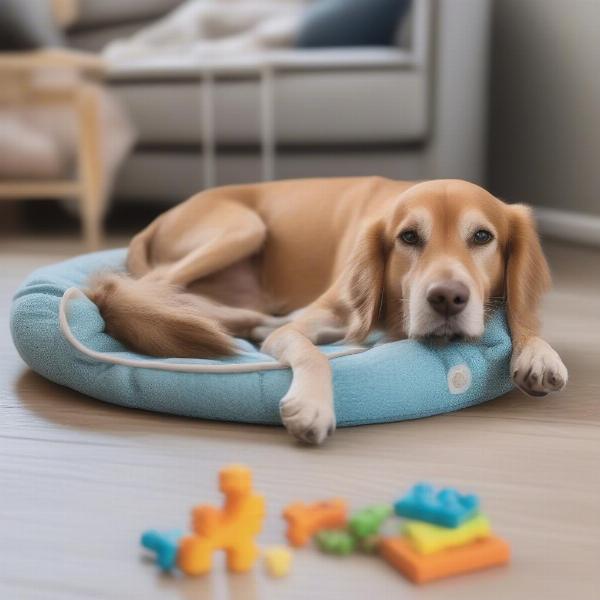Understanding the needs of your furry friend is crucial, especially when it comes to supervision. The question “does pupsi have 24-hour dog supervision?” highlights a common concern for dog owners. While constant, around-the-clock supervision isn’t always feasible, ensuring your dog’s safety and well-being is paramount. This article will explore the nuances of dog supervision, addressing various factors like age, breed, and individual personality, to help you determine the appropriate level of care for your Pupsi.
Dogs, much like children, require different levels of supervision depending on their age and maturity. Puppies, with their boundless energy and penchant for mischief, need significantly more attention than adult dogs. They are prone to chewing on inappropriate items, getting into trouble, and having accidents. Leaving a puppy unsupervised for extended periods can be detrimental to their development and potentially dangerous. Adult dogs, especially those who are well-trained and accustomed to a routine, can generally handle being alone for a few hours. However, even the most well-behaved dog shouldn’t be left alone for excessively long periods. Senior dogs may also require more supervision due to potential health issues or cognitive decline.
Breed characteristics also play a significant role in determining supervision needs. High-energy breeds like Border Collies or Huskies require more physical and mental stimulation than breeds like Bulldogs or French Bulldogs. Without adequate exercise and engagement, these energetic breeds can become bored and destructive when left alone. Some breeds are also more prone to separation anxiety, making it crucial to address their emotional needs and establish a safe and comfortable environment.
Beyond age and breed, your dog’s individual personality and behavior should be considered. A dog with a history of anxiety or destructive behavior will require more supervision than a calm and well-adjusted dog. Observe your dog’s behavior when left alone for short periods. Signs of anxiety, such as excessive barking, whining, pacing, or destructive chewing, indicate a need for increased attention and potentially professional help.
What are the alternatives to 24-hour supervision?
While continuous supervision might not be practical, several alternatives can ensure your Pupsi’s safety and well-being. Doggy daycare provides a supervised environment for socialization and play, while dog walkers can offer much-needed exercise and companionship during the day. For longer absences, consider hiring a pet sitter who can provide personalized care and attention in your home.
How to prepare your dog for alone time?
Gradual training is key to helping your dog adjust to being alone. Start with short periods of separation and gradually increase the duration. Create a comfortable and enriching environment with toys, puzzles, and a safe space. Establishing a consistent routine can also help reduce anxiety and provide a sense of security.
Is 24-hour supervision necessary for all dogs?
No, 24-hour supervision isn’t necessary for all dogs. Adult dogs, particularly those who are well-trained and well-adjusted, can typically handle being alone for several hours. However, puppies, senior dogs, and dogs with specific needs require more attention and care.
 Preparing your dog for being alone
Preparing your dog for being alone
Conclusion
While “does pupsi have 24-hour dog supervision?” is a valid concern, the answer isn’t always a simple yes or no. The ideal level of supervision depends on various factors, including your dog’s age, breed, personality, and individual needs. By understanding these factors and implementing appropriate strategies, you can ensure your Pupsi’s safety, happiness, and well-being.
FAQ
- How long can I leave my adult dog alone? Most healthy adult dogs can handle being alone for 4-6 hours.
- Is it cruel to leave a dog alone overnight? Leaving a dog alone overnight can be challenging and depends on the individual dog. If your dog is comfortable and well-adjusted, it might be acceptable, but puppies and dogs with separation anxiety should not be left alone for such extended periods.
- How can I prevent separation anxiety in my dog? Gradual training, creating a positive association with being alone, and providing enrichment can help prevent separation anxiety.
- What are the signs of separation anxiety in dogs? Excessive barking, destructive chewing, pacing, and house soiling are common signs of separation anxiety.
- Should I crate train my dog? Crate training can be a helpful tool for house training and providing a safe space for your dog. However, it shouldn’t be used as a punishment and should be introduced gradually and positively.
- What are the benefits of doggy daycare? Doggy daycare offers socialization, exercise, and mental stimulation in a supervised environment.
- How do I choose a reputable dog walker or pet sitter? Ask for referrals, check reviews, and meet the individual beforehand to ensure they are a good fit for your dog.
About ILM Dog: ILM Dog is your trusted resource for comprehensive dog care information, covering everything from breed selection and puppy care to senior dog health and training tips. We offer expert advice on nutrition, grooming, and behavior, helping you provide the best possible care for your furry companion. For personalized guidance or further assistance, reach out to our team at [email protected] or call us at +44 20-3965-8624.